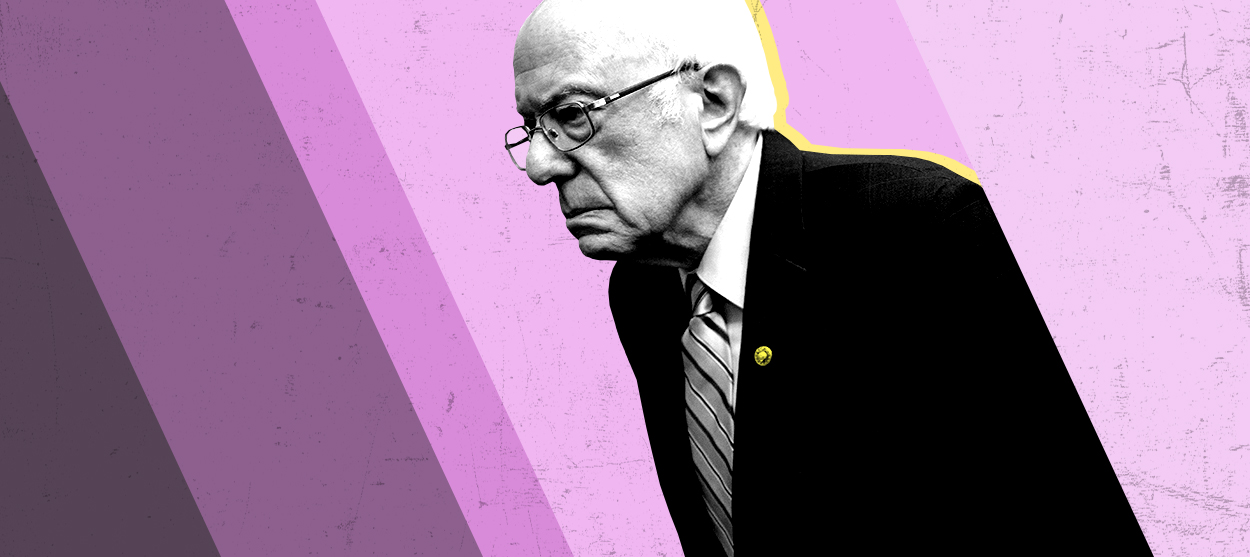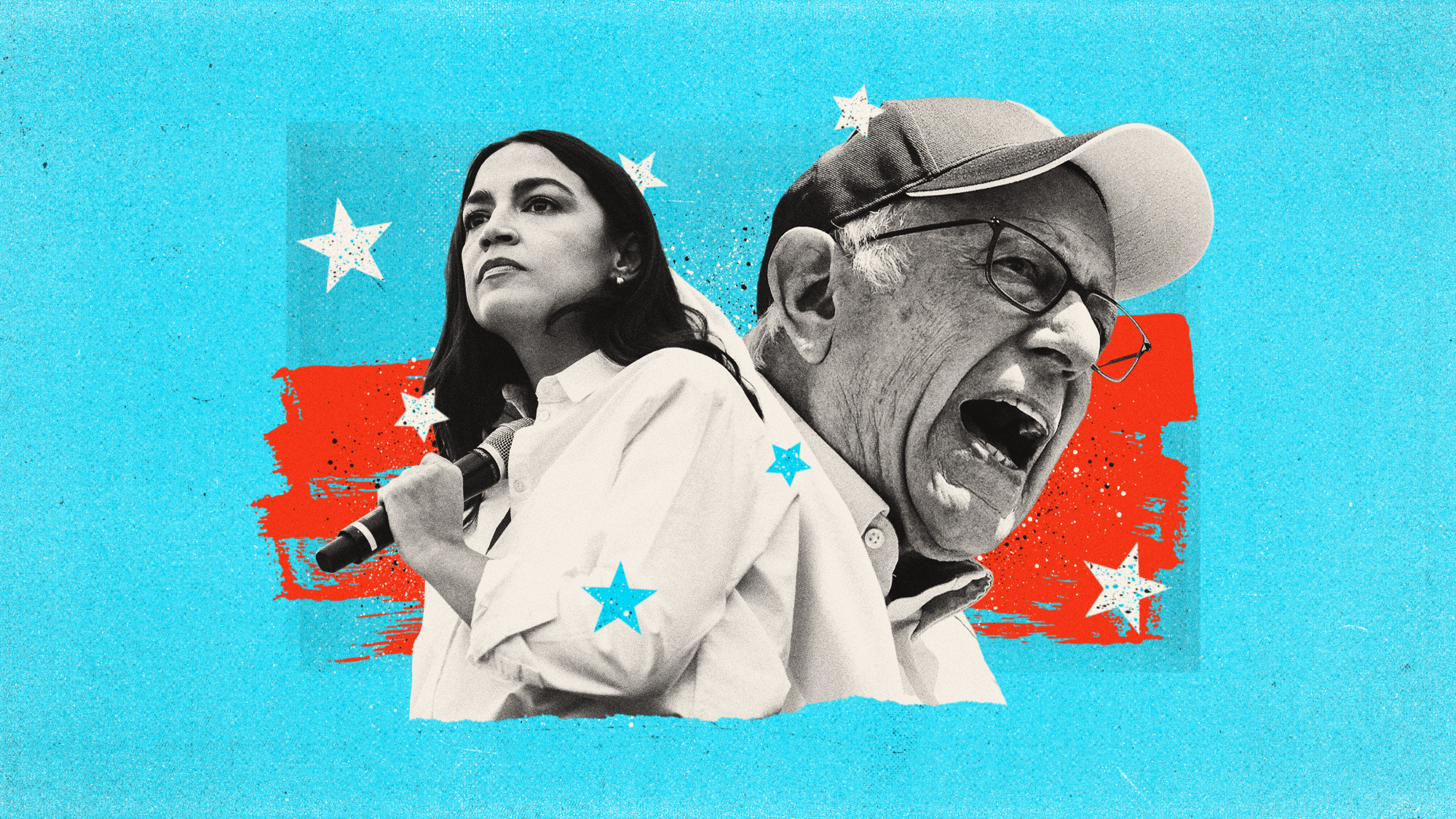Coronavirus ended any last hopes of a Bernie Sanders comeback
He had already lost. But the outbreak was the end of the campaign.


A free daily email with the biggest news stories of the day – and the best features from TheWeek.com
You are now subscribed
Your newsletter sign-up was successful
It's been real, hasn't it? After 13 months of campaigning, during which time he was briefly but almost unanimously considered the frontrunner for the 2020 Democratic presidential nomination, it looks as if Bernie Sanders is finally calling it quits. On Wednesday afternoon his staff shot down an erroneous report that he had formally dropped out; it looks as if he'll wait to make that announcement sometime before the next primaries three weeks from now. To many observers it has been unclear why the junior senator from Vermont remained in the race after losing Michigan and Washington state two weeks ago, a defeat he followed with kind words about his fellow candidates and half-hearted conciliatory gestures towards the DNC.
The math for Sanders has looked all but impossible for a long time. The only hope that remained was some kind of mythical 1920s barnstorming campaign across the country — a final quixotic assault on the fortresses of the Democratic establishment. With this now out of the question and his only opportunities for shoring up his base and attempting to poach uneasy Biden supporters limited to YouTube, it is easy to understand why would finally give up. It is impossible to imagine terms more favorable to Sanders' only remaining opponent than a nation-wide ban on public appearances coupled with the directive that persons over the age of 60 keep to themselves.
Plenty of words (though almost certainly not as many as there might have been if the de facto end of the primary season had not coincided with the coronavirus pandemic) will be written about Sanders's brief rise and more or less instantaneous fall. Some observers will insist that Sanders lost largely because party insiders conspired against him, something that is belied by his poor showing even in states that he won, in some cases handily, in 2016. Others will give the credit to coronavirus, even though Biden's post-Nevada comeback had been secured long before this disease had established itself at the forefront of the American public imagination.
The Week
Escape your echo chamber. Get the facts behind the news, plus analysis from multiple perspectives.

Sign up for The Week's Free Newsletters
From our morning news briefing to a weekly Good News Newsletter, get the best of The Week delivered directly to your inbox.
From our morning news briefing to a weekly Good News Newsletter, get the best of The Week delivered directly to your inbox.
This is not to suggest that at the margins the DNC did not do everything in its power to prevent a Sanders nomination. The virtually unprecedented speed with which the remains of the largest field of technically plausible candidates in the history of these contests dropped out and endorsed Biden tells us everything we need to know about whom the party wanted at the top of the ticket. But this consolidation would not have taken place if the will of core Democratic primary voters, not just in the South but in states as far ranging as Massachusetts and Idaho, had not already been made clear.
What will become of Sanders' movement now that his presidential aspirations have been forestalled once again? Does he really represent the future of the Democratic party? A somewhat lesser-noticed contest on Tuesday hints at an answer. Whatever her objections to the Green New Deal and Medicare-for-all, there is one issue that matters more to Nancy Pelosi than anything else: abortion. This was made clear on Tuesday when Rep. Dan Lipinski of Illinois, an eight-term socially conservative Democratic incumbent and product of the old Chicago political machine, lost his primary race to Marie Newman, a progressive challenger endorsed by Sanders, Rep. Alexandria Ocasio-Cortez of New York, and numerous other high-profile left-wing politicians. There may not be much room for radical economic views in the Democratic Party, but in the coming realignment there is none at all for folks like Lipinski, who received virtually no support from his party's establishment. If progressives want to make inroads with the DNC, they must do what Sanders did not in 2016 (and did only half-heartedly in 2020) and put social issues at the forefront of their messaging.
This brings us to the other question about Sanders and his supporters: whether they will turn out for Biden in the fall. Here it is worth remembering that in some states (including Michigan) in 2016, the Green Party candidate Jill Stein won a share of the vote wider than Trump's eventual margin of victory. Sanders himself will almost certainly endorse Biden, just as he endorsed Hillary Clinton in 2016. Will this make a difference? Who knows.
November seems very remote, longer away, indeed, than it felt two months ago. While it is possible at this stage to talk about how the general election might go — the actual range of possibilities is not unlimited — there are more pressing questions to be answered. If the most pessimistic forecasts prove correct, it is likely that the political conventions scheduled by both of our major political parties for this summer will have to be canceled, postponed, or held in what would almost certainly be the largest, most feedback-laden video calls in the history of Google Hangouts. For this small unhoped-for mercy, Sanders' supporters should be grateful. The reality of Biden's victory will not be setting in for a while.
A free daily email with the biggest news stories of the day – and the best features from TheWeek.com
Want more essential commentary and analysis like this delivered straight to your inbox? Sign up for The Week's "Today's best articles" newsletter here.
Matthew Walther is a national correspondent at The Week. His work has also appeared in First Things, The Spectator of London, The Catholic Herald, National Review, and other publications. He is currently writing a biography of the Rev. Montague Summers. He is also a Robert Novak Journalism Fellow.
-
 The ‘ravenous’ demand for Cornish minerals
The ‘ravenous’ demand for Cornish mineralsUnder the Radar Growing need for critical minerals to power tech has intensified ‘appetite’ for lithium, which could be a ‘huge boon’ for local economy
-
 Why are election experts taking Trump’s midterm threats seriously?
Why are election experts taking Trump’s midterm threats seriously?IN THE SPOTLIGHT As the president muses about polling place deployments and a centralized electoral system aimed at one-party control, lawmakers are taking this administration at its word
-
 ‘Restaurateurs have become millionaires’
‘Restaurateurs have become millionaires’Instant Opinion Opinion, comment and editorials of the day
-
 The billionaires’ wealth tax: a catastrophe for California?
The billionaires’ wealth tax: a catastrophe for California?Talking Point Peter Thiel and Larry Page preparing to change state residency
-
 Mamdani vows big changes as New York’s new mayor
Mamdani vows big changes as New York’s new mayorSpeed Read
-
 Bari Weiss’ ‘60 Minutes’ scandal is about more than one report
Bari Weiss’ ‘60 Minutes’ scandal is about more than one reportIN THE SPOTLIGHT By blocking an approved segment on a controversial prison holding US deportees in El Salvador, the editor-in-chief of CBS News has become the main story
-
 Has Zohran Mamdani shown the Democrats how to win again?
Has Zohran Mamdani shown the Democrats how to win again?Today’s Big Question New York City mayoral election touted as victory for left-wing populists but moderate centrist wins elsewhere present more complex path for Democratic Party
-
 Millions turn out for anti-Trump ‘No Kings’ rallies
Millions turn out for anti-Trump ‘No Kings’ ralliesSpeed Read An estimated 7 million people participated, 2 million more than at the first ‘No Kings’ protest in June
-
 Ghislaine Maxwell: angling for a Trump pardon
Ghislaine Maxwell: angling for a Trump pardonTalking Point Convicted sex trafficker's testimony could shed new light on president's links to Jeffrey Epstein
-
 The last words and final moments of 40 presidents
The last words and final moments of 40 presidentsThe Explainer Some are eloquent quotes worthy of the holders of the highest office in the nation, and others... aren't
-
 The anger fueling the Bernie Sanders and Alexandria Ocasio-Cortez barnstorming tour
The anger fueling the Bernie Sanders and Alexandria Ocasio-Cortez barnstorming tourTalking Points The duo is drawing big anti-Trump crowds in red states
